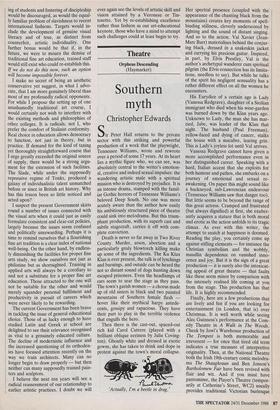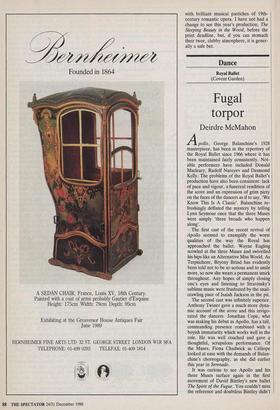Theatre
Orpheus Descending (Haymarket)
Southern myth
Christopher Edwards
Sir Peter Hall returns to the private sector with this striking and powerful production of a work that the playwright, Tennessee Williams, wrote and rewrote over a period of some 17 years. At its heart lies a mythic figure who, we can see, was absolutely central to the writer's emotion- al, creative and indeed sexual impulses: the wandering artistic male with a spiritual mission who is destroyed by prejudice. It is an intense drama, stamped with the famil- iar Gothic horrors of Tennessee Williams's beloved Deep South. No one was more acutely aware than the author how easily his ambitiously structured piece of theatre could sink into melodrama. But this trium- phant production, with its superb cast and subtle stagecraft, carries it off with com- plete conviction.
Death is never so far away in Two River County. Murder, arson, abortion and a particularly grisly blowtorch killing make up some of the ingredients. The Ku Klux Klan is ever present, the talk is of lynchings and burnings, and outside can be heard the not so distant sound of dogs hunting down escaped prisoners. Even the headlamps of cars seem to sear the stage as they pass. The town's garish women — a chorus made up of old sisters in black and two painted mountains of Southern female flesh — hover like their mythical harpy antede- cents, gossipy and rapacious. They have their part to play in the terrible violence that engulfs the hero.
Then there is the cast-out, spaced-out rich kid Carol Cutrere (played with a brilliant oblique eeriness by Julie Coving- ton). Ghostly white and dressed in exotic gowns, she has taken to drink and dope in protest against the town's moral collapse.
'Actually, I'm a beetle in drag.' Her spectral presence (coupled with the appearance of the chanting black from the mountains) creates key moments of spell- binding stillness, cleverly underscored by lighting and the sound of distant singing. And so to the action. Val Xavier (Jean- Marc Barr) materialises behind the conjur- ing black, dressed in a snakeskin jacket and carrying his precious guitar. Inspired, in part, by Elvis Prestley, Val is the author's archetypal wanderer cum spiritual pilgrim (the Elvis connection has its limita- tions, needless to say). But while he talks of the spirit his negligent sensuality has a rather different effect on all the women he encounters.
His Eurydice of a certain age is Lady (Vanessa Redgrave), daughter of a Sicilian immigrant who died when his wine-garden was burned down by the Klan years ago. Unknown to Lady, the man she has mar- ried, Jabe, was leader of the Klan that night. The husband (Paul Freeman), yellow-faced and dying of cancer, stalks the house with a macabre, learing grin. This is Lady's joyless lot until Val arrives.
Vanessa Redgrave cannot have given a more accomplished performance even in her distinguished career. Speaking with a hard, Italian accent that she exploits for both humour and pathos, she embarks on a journey of emotional and sexual re- awakening. On paper this might sound like a hackneyed, sub-Lawrencian endeavour (Tennessee Williams saw that danger too). But little seems to be beyond the range of this great actress. Cramped and frustrated (but always dignified) at first, she exuber- antly acquires a stature that is both moral and erotic as the action unfolds to its tragic climax. As ever with this writer, the attempt to snatch at happiness is doomed. Reading the play, you certainly come up against stifling elements — for instance the Christian symbolism and the wobbly, maudlin dependence on vanished inno- cence and joy. But it is the sign of a great production — it is surely also the intoxicat- ing appeal of great theatre — that faults like these seem minor by comparison with the intensely realised life coming at you from the stage. This production has that life. It is highly recommended.
Finally, here are a few productions that are lively and fun if you are looking for entertainment (in London, that is) over Christmas. It is well worth while seeing Alec Guinness's performance at the Com- edy Theatre in A Walk in The Woods. Cheek by Jowl's Warehouse production of The Tempest is both memorable and irreverent — for once that tired old term indicates a true measure of interpretive originality. Then, at the National Theatre both the Irish 19th-century comic melodra- ma The Shaughraun and Ben Jonson's Bartholomew Fair have been revived with flair and wit. And if you must have pantomime, the Player's Theatre (tempor- arily at Catherine's Street, WC2) usually provides traditional Victorian burlesque with brilliant musical pastiches of 19th- century romantic opera. I have not had a change to see this year's production, The Sleeping Beauty in the Wood, before the print deadline, but, if you can stomach their twee, clubby atmosphere, it is gener- ally a safe bet.











































































































 Previous page
Previous page